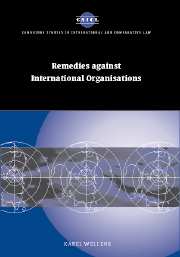Book contents
- Frontmatter
- Contents
- Acknowledgements
- List of abbreviations
- Introduction
- Part I General features of remedies against international organisations
- 1 The accountability regime for international organisations
- 2 Remedies against international organisations
- 3 The different levels of accountability and the appropriateness of various remedies: scope ratione materiae
- 4 Access to remedies
- 5 Remedies against whom: the scope ratione personae respondentis
- 6 The potential outcome of remedies: scope ratione remedii
- Part II Procedural aspects of remedial action against international organisations
- Part III Substantive outcome of remedial action against international organisations
- Part IV Alternative remedial action against international organisations and options for the future
- Conclusion
- Bibliography
- Index
- CAMBRIDGE STUDIES IN INTERNATIONAL AND COMPARATIVE LAW
5 - Remedies against whom: the scope ratione personae respondentis
Published online by Cambridge University Press: 13 July 2009
- Frontmatter
- Contents
- Acknowledgements
- List of abbreviations
- Introduction
- Part I General features of remedies against international organisations
- 1 The accountability regime for international organisations
- 2 Remedies against international organisations
- 3 The different levels of accountability and the appropriateness of various remedies: scope ratione materiae
- 4 Access to remedies
- 5 Remedies against whom: the scope ratione personae respondentis
- 6 The potential outcome of remedies: scope ratione remedii
- Part II Procedural aspects of remedial action against international organisations
- Part III Substantive outcome of remedial action against international organisations
- Part IV Alternative remedial action against international organisations and options for the future
- Conclusion
- Bibliography
- Index
- CAMBRIDGE STUDIES IN INTERNATIONAL AND COMPARATIVE LAW
Summary
The claimant's approach
Except in situations where states have intentionally acted jointly and in concert, legal remedial actions based on claims of state responsibility have in most cases been addressed to one single state allegedly being solely liable or responsible. Requesters or claimants considering similar action vis-à-vis an international organisation – irrespective of their ranking on the preferential standing list – face the additional problem that acts, actions or omissions being decided or undertaken by an international organisation are the direct result of political decision-making by the organisation's organs composed of member states, which are, moreover, the suppliers of the organisation's financial resources. In the process of selecting the appropriate forum for a possible legal action it will be particularly relevant for claimants to consider, obviously on a prima facie basis, if, how and under what circumstances (the) member states can be held liable/responsible and to what extent may direct, concurrent or subsidiary recourse be had to (the) member states.
The claimant third party may consider that its chances could be improved if the remedial action could be instigated jointly against the international organisation and its member states, or in any event by taking a subsidiary approach in case the organisation would not be willing or capable to carry out the obligations it had entered into (contractual) or which allegedly arise for it otherwise (non-contractual).
- Type
- Chapter
- Information
- Remedies against International Organisations , pp. 44 - 53Publisher: Cambridge University PressPrint publication year: 2002



